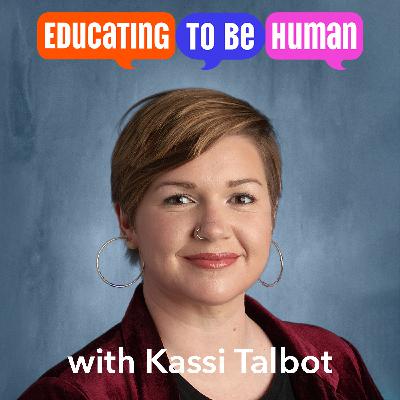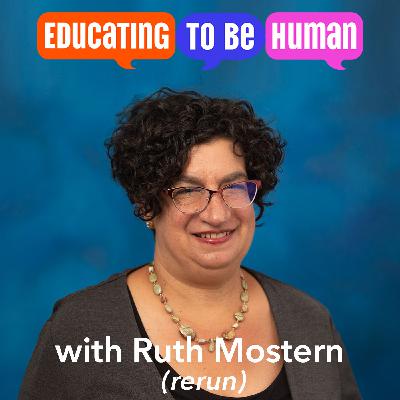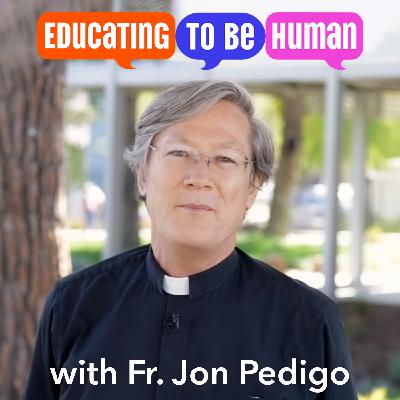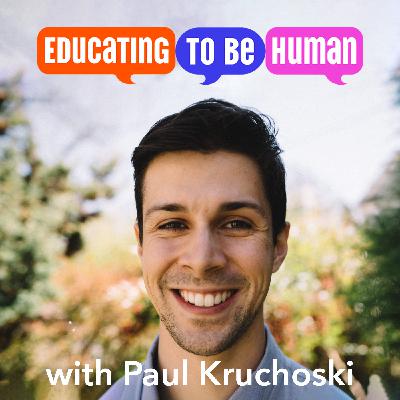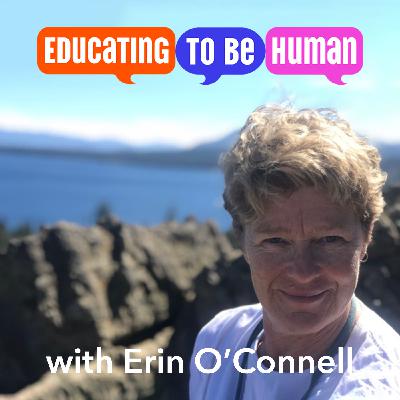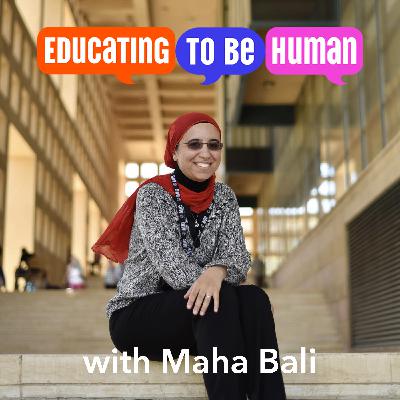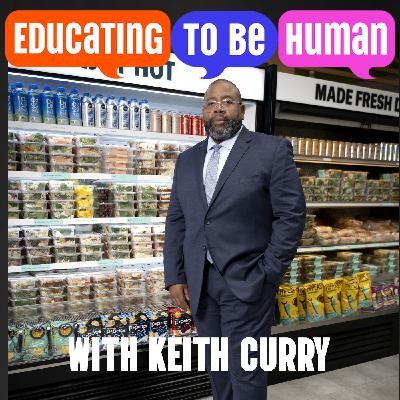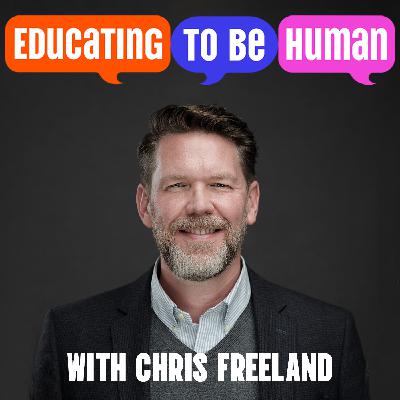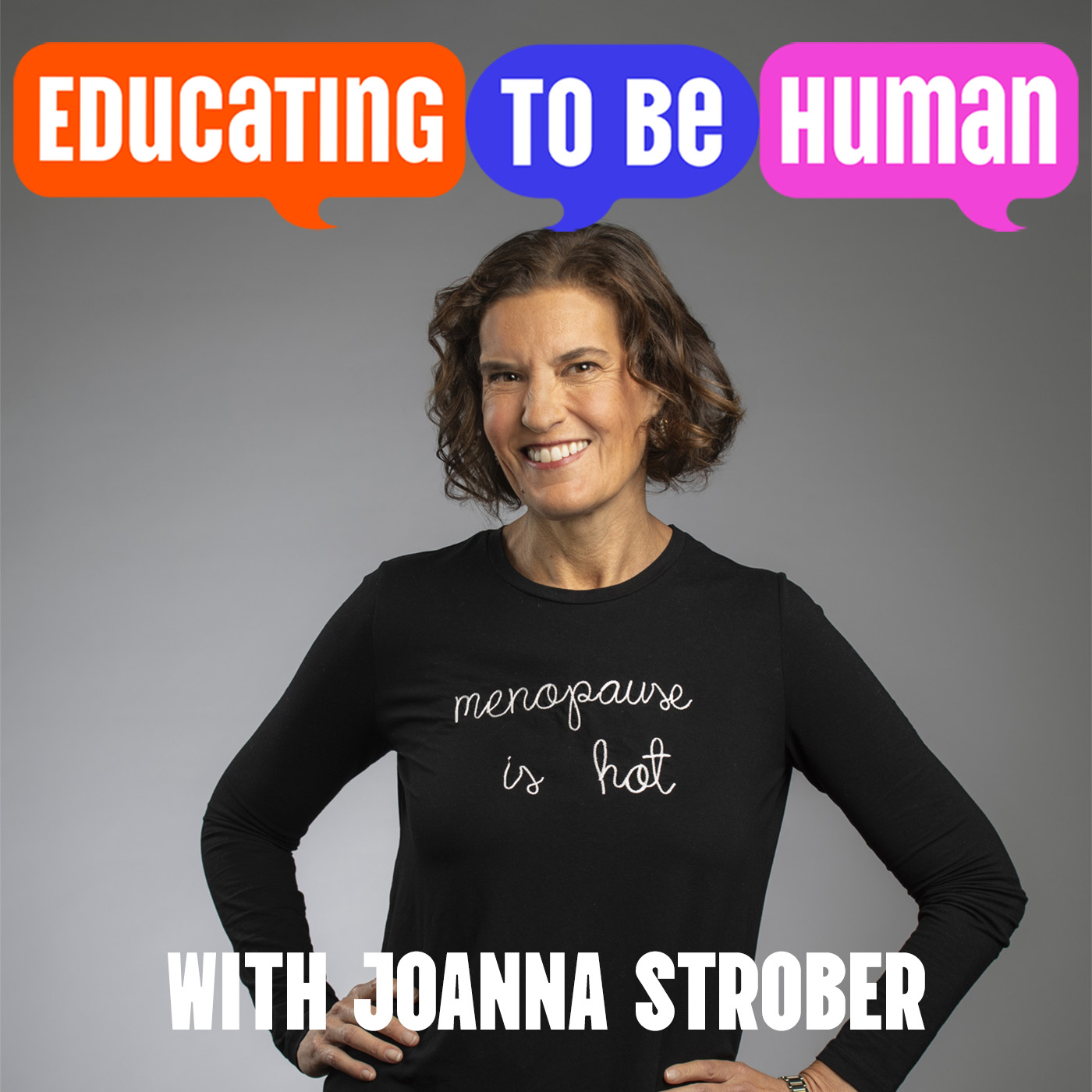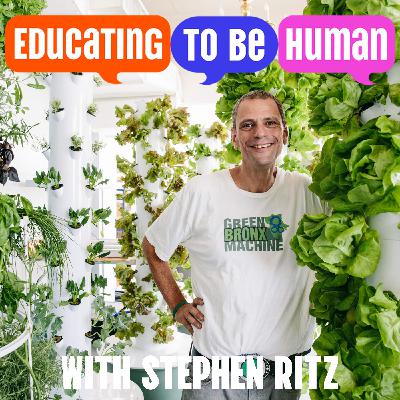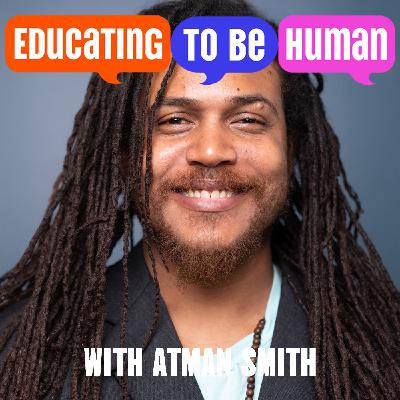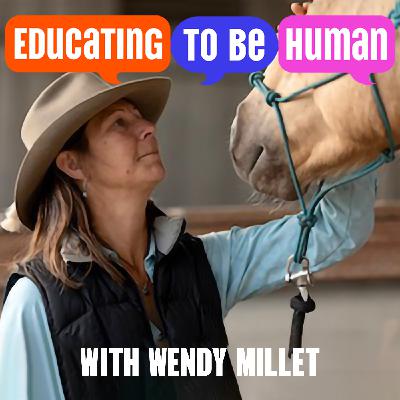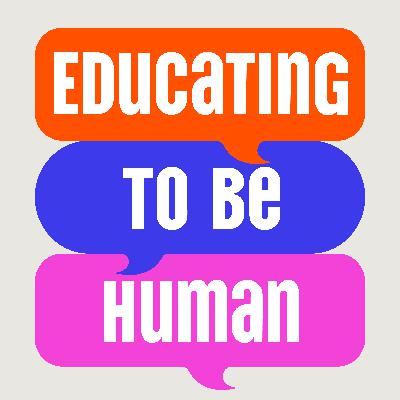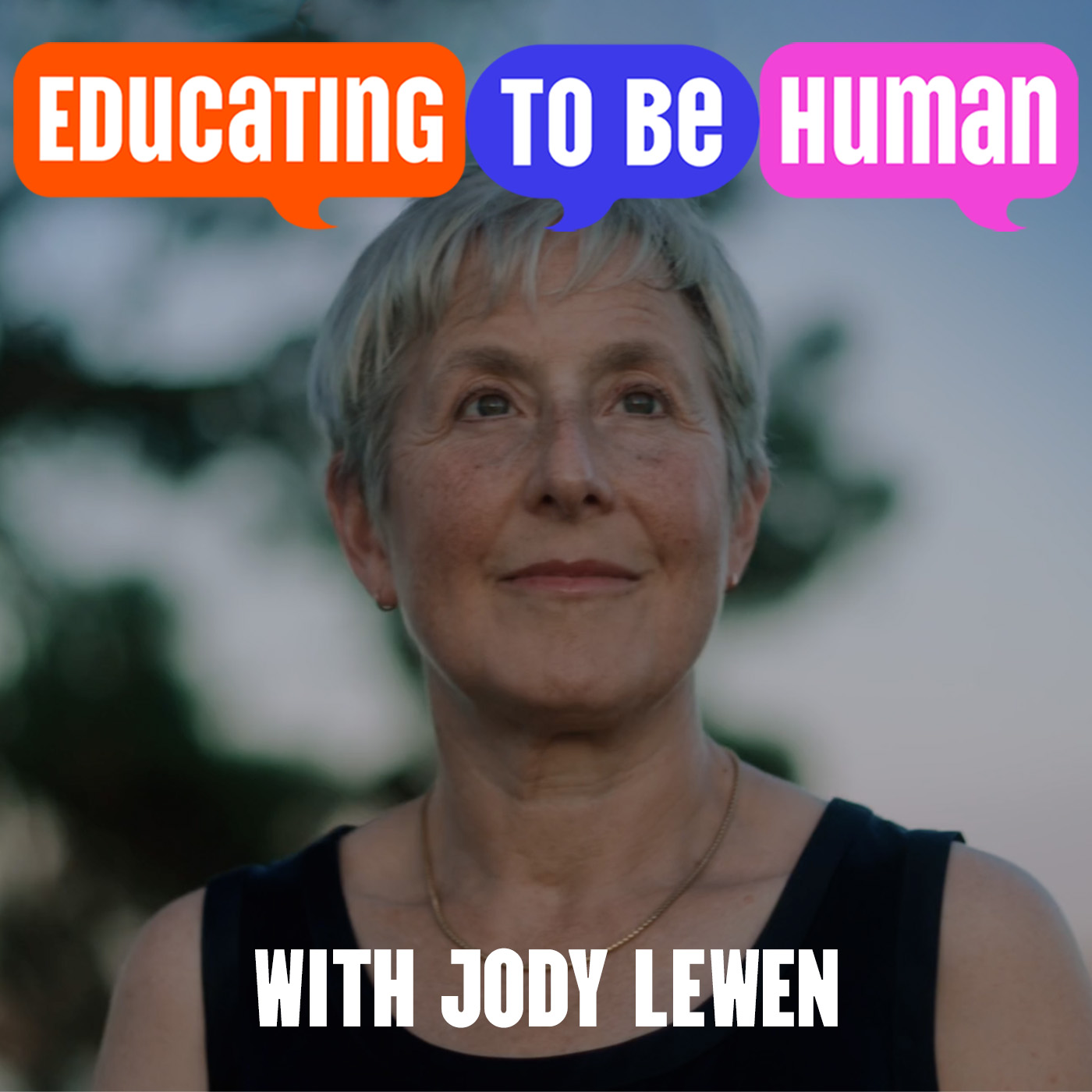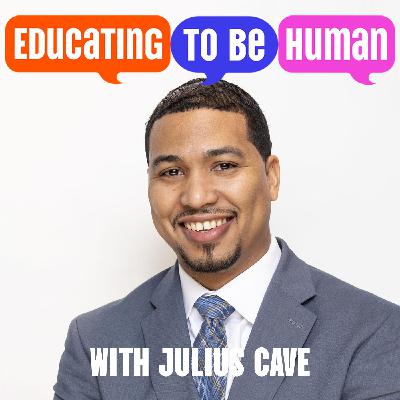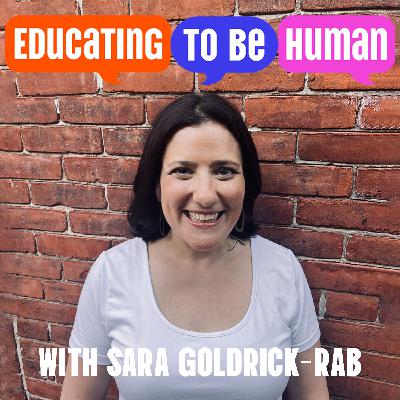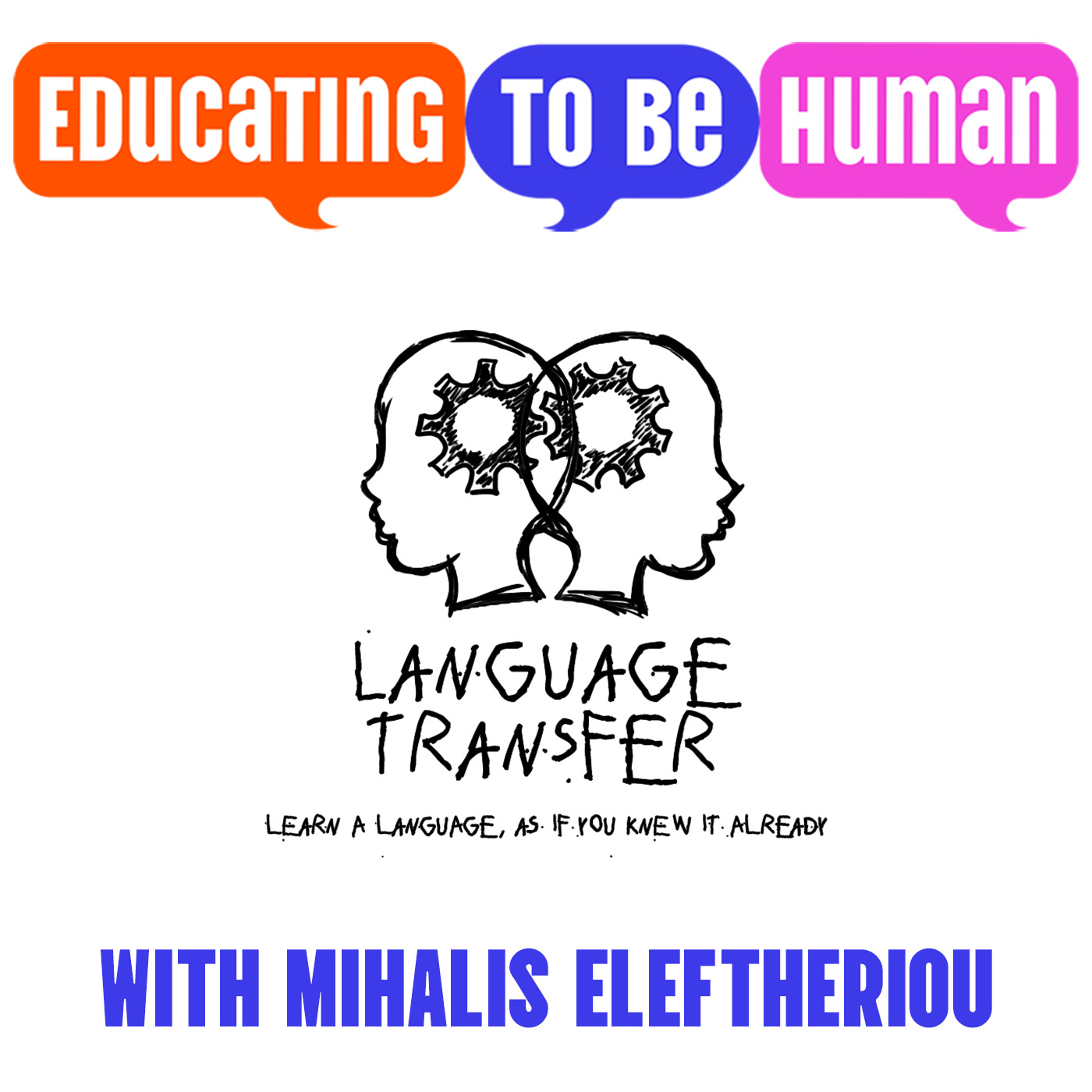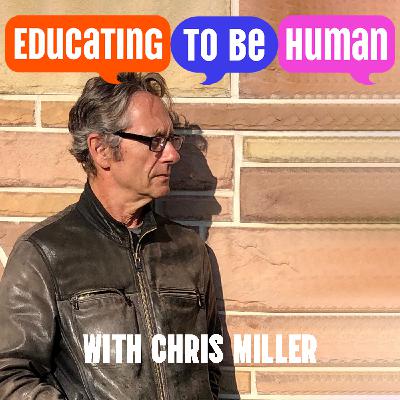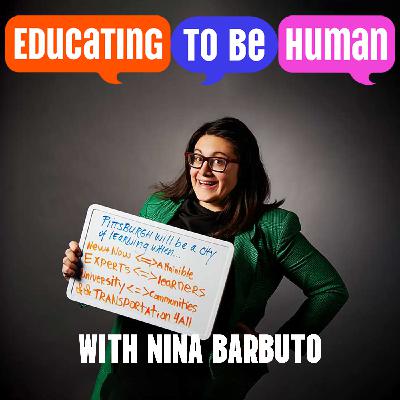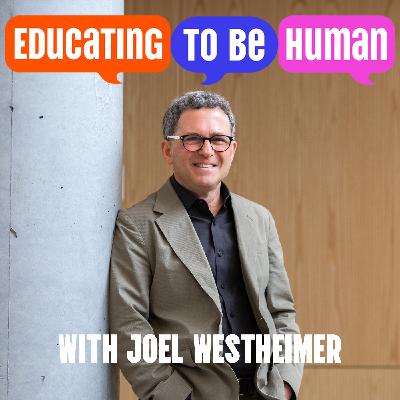Discover Educating to Be Human Podcast
Educating to Be Human Podcast

Educating to Be Human Podcast
Author: Lisa Petrides
Subscribed: 1Played: 16Subscribe
Share
© 2024
Description
A bi-weekly podcast hosted by Lisa Petrides, CEO and Founder of the Institute for the Study of Knowledge Management in Education (ISKME), "Educating to Be Human" explores what it means to be human in today's evolving cultural and societal landscape. In each episode, Lisa speaks with people whose work addresses the challenges and possibilities of how we might educate and inspire transformative change in modern society, which reaches beyond the traditional classroom.
In Season 2, we examine who controls access to knowledge, how learning is accelerated through embodied experiences, and how education is essential for resilience and connection in an evolving world.
Think if Big Ideas Fest were a podcast, Educating to Be Human is born from the desire to keep the conversations going and making the knowledge we have gained and stories we've heard accessible to all. By bringing these unique voices into the podcast world, we are furthering ISKME's commitment to make learning and knowledge-sharing participatory, equitable, and open.
Educating to be Human is hosted by Lisa Petrides, produced by Helene Theros, recorded by Nathan Sherman, and edited by Ty Mayer. Season 2 music is created by Orestis Koletsos.
In Season 2, we examine who controls access to knowledge, how learning is accelerated through embodied experiences, and how education is essential for resilience and connection in an evolving world.
Think if Big Ideas Fest were a podcast, Educating to Be Human is born from the desire to keep the conversations going and making the knowledge we have gained and stories we've heard accessible to all. By bringing these unique voices into the podcast world, we are furthering ISKME's commitment to make learning and knowledge-sharing participatory, equitable, and open.
Educating to be Human is hosted by Lisa Petrides, produced by Helene Theros, recorded by Nathan Sherman, and edited by Ty Mayer. Season 2 music is created by Orestis Koletsos.
24 Episodes
Reverse
In the season finale of Educating to Be Human, we turn our attention to rural education and the transformative power of community-centered learning. Host Lisa Petrides is joined by Kassi Talbot, educator, social justice advocate, and principal of Pescadero Elementary School, a small rural school on California's coastside. Born and raised in the same community she now leads, Kassi shares how participatory and community-based education, and a deep commitment to equitable, open education can drive lasting positive outcomes — not just in remote or non-urban schools, but across all systems of learning. This episode explores what it means to center humanity, care, and connection in education, reminding us that the lessons from small schools and rural communities often hold the keys to building a more inclusive and transformative future for all learners. Kassandra "Kassi" Talbot, EdD, is an educator and principal dedicated to her local rural schools. With nearly a decade of classroom experience teaching middle school social studies and high school Spanish, Kassi centers her work on antiracist and equitable practices. Her doctoral research, "Reclaiming the Story: YPAR in the Rural Social Studies Classroom," explored how youth can (re)claim history and stories through participatory action research. Kassi serves her community through local leadership, human rights training, and youth mentorship. She lives on the California coast with her dogs, and extended family — where she's working to build the kind of community her students will one day lead. LinkedIN: www.linkedin.com/in/kassandratalbot https://www.lhpusd.com/
Today, we're revisiting one of our favorite conversations from Educating to Be Human — and much has changed since we first recorded it. Back in September 2024, Lisa sat down with Ruth Mostern, Professor of History and founder of the World Historical Gazetteer, to explore how our sense of place influences the way we understand our past and our identities. Through her groundbreaking project, the World Historical Gazetteer, Ruth enables historians and the public alike to visualize and contextualize historical events and relationships geographically, transforming static history into dynamic, place-based storytelling. Since that conversation, we've seen how place names and their meanings continue to shift - and spark debate - reminding us just how deeply history is woven into geography. This year, Ruth and her team also launched something brand new: the Institute for Spatial History Innovation, or ISHI, at the University of Pittsburgh. https://ishi.pitt.edu/ - now the new home for the World Historical Gazetteer. Resources: The Institute for Spatial History Innovation: ishi.pitt.edu Ruth Mostern at University of Pittsburgh: www.history.pitt.edu/people/ruth-mostern
In this episode of Educating to be Human, Lisa is joined by Jon Pedigo, known by some as Father Jon. He is a longtime social justice advocate and activist, faith leader within the Catholic diocese of San Jose, and the new executive director of People Acting in Community Together, or PACT. In conversation, they explore what it means to rebuild connection in a time of deep division, how faith communities can act as ancient technologies for compassion and healing, and the power of grassroots organizing to help people claim their own agency and voice, particularly in difficult times. Fr. Jon Pedigo, a Bay Area native, has been active in civic affairs and social justice causes for over 35 years in the Bay Area. Working with the interfaith community of Silicon Valley, labor, community organizers, and civil rights activists, Fr. Jon was just named the Executive Director for PACT, People Acting In Community Together. In his previous position as the Director of Advocacy and Community Engagement for Catholic Charities of Santa Clara County, he developed a methodology of trauma-informed community organizing for people living in chronic poverty, refugees, and immigrant families. Fr. Jon has been acknowledged as a social justice advocate for immigrants and social change by many local organizations and received commendations from various public officials. Resources: https://www.cliniclegal.org/stories/grupo-de-solidaridad-brings-community-together https://www.americamagazine.org/faith/2020/06/11/what-church-san-jose-doing-prepare-post-covid-future https://www.pbssocal.org/shows/socal-connected/how-california-went-from-anti-immigration-to-sanctuary-state Transcript: 00:00:06 - 00:33:16 Jon Pedigo: The core of our humanity and what defines us isn't these separations, but it's our ability to care and heal. And through that kind of impulse religions kind of evolved as a technology to pull out of the best of humanity, our ability to connect to each other and to connect to the divine. 00:33:18 - 01:04:06 Lisa Petrides This is Educating to be Human. And I'm your host, Lisa Petridis, founder of the Institute for the Study of Knowledge Management in Education. In each episode, I sit down with ordinary people, creating extraordinary impact people who are challenging notions of how we learn, why we learn, and who controls what we learn. Thank you very much for listening. 01:04:08 - 01:45:23 Lisa Petrides I'm so delighted to be speaking with Jon Pedigo today. Also known by some as Father Jon and he is a longtime social justice advocate and faith leader within the Catholic Diocese of San Jose, California, and the new executive Director of People Acting in Community Together or PACT. Pact. And in our conversation, we explore what it means to rebuild connection in a time of deep division and how faith communities can act as ancient technologies for compassion and healing. 01:46:00 - 01:56:00 Lisa Petrides And the power of grassroots organizing to help people claim their own agency and voice. So welcome, Jon and thank you for being with us here today. 01:56:01 - 01:58:01 Jon Pedigo: Thanks, Lisa. 01:58:03 - 02:17:24 Lisa Petrides So we're living in a time of fragmentation, right? Deep polarization, ICE raids in cities, authoritarian impulses on the rise. I mean, even technology is threatening to replace human connection. What do you see as the defining challenges of this moment? 02:18:01 - 02:51:22 Jon Pedigo: What are defining challenges of this moment really are in just the profound loss of relationships that are in our community, the sort still profound separation, the divorce that happens in families because of ideology and politics. And in many cases, for good reason that people just simply aren't safe in their homes or in their families. They're not feeling safe in their churches and not feeling safe in their workplaces. 02:51:24 - 03:13:06 Jon Pedigo: They can't really speak their mind. They can't speak out of their heart. So it is not just policy and politics, but it is this very bizarre impulse of division that really is more like a divorce and not a disagreement. And that's kind of where we're coming from on this. 03:13:08 - 03:23:18 Lisa Petrides: So in the face of this fear and hostility and division, what role can faith communities and spiritual traditions play in bringing people together? 03:23:20 - 04:09:03 Jon Pedigo: Yeah, that's a great question. I was actually giving a talk the other day, and I brought this, I used religion as a kind of explaining it as, like an ancient technology that, is used to enhance, magnify, amplify our most human dimension, which is compassion and caretaking. Like Margaret Mead said, the sign that she found. And I think there's an old saying, but she just said that the the oldest sign, the oldest indication of human civilization is a healed femur, because that would indicate that the humanoid that was injured was cared for rather than left. 04:09:06 - 04:42:19 Jon Pedigo: And if you're kind of cutting one's losses that this member of this group of humanoids had felt that it was important that we need to kind of stay together and including this weak person this kind of this link that isn't the strongest. And so that indicated that there was, a decision of care. So that would indicate that at the core of our humanity and what defines us isn't these separations, but is our ability to care and heal. 04:42:21 - 05:13:00 Jon Pedigo: And through that kind of impulse. Religion's kind of evolved as a technology to pull out of the best of humanity, our ability to connect to each other and to connect to the divine. However, that was defined by early human groupings and societies to find a way to protect and to nurture each other, and especially to pay attention to the weakest among us. 05:13:02 - 05:37:23 Jon Pedigo: And so that religion, that dimension is dependent on three things. First is that we're connected to each other, that we are connecting out of concern that there is a there's a connection, a social bond, a connection that kind of a I don't know what you would call it, a kind of a covenant. Although that covenant with that concept evolved much, much later. 05:37:23 - 05:54:15 Jon Pedigo: But there is a a real bond of connectivity. The second thing that's important to recognize is that this bond is connected to actual everyday decisions, right? You know how we're going to actually do things, how we're going to run our how we're going to run our tribe, how we're going to run our our society are going to run this village. 05:54:21 - 06:25:06 Jon Pedigo: It's with that concern. And the third part is, of course, the divine is that, that that cover all overall sense of that. We stand before some kind of force that could be defined as a nature, could be defined as a spiritual contact, a certain existential dimension of us, that we're connecting to that. So those three pieces kind of bring together what what kind of early religions, religious systems. 06:25:08 - 07:13:21 Jon Pedigo: And so religion is that technology. The work that I do today, you know, hundreds of thousands of years later is, you know, it hasn't changed that much, especially in community organizing, that we spend the time to understand the impact of, of injuries caused by poverty, violence, lack of access to housing, the constant fear of lives being separated, destroyed by deportation, or just the trauma of having violent experiences, of having to leave one's own country, not out of one's own will, but out of necessity, working with people that have seen death, that have lost their children in a jungle, crossing a river, in the Darien Gap. 07:14:02 - 07:34:09 Jon Pedigo: People walking across countries. These are people that we know. These are people that are our base. And there's this trauma that's happened. And so our work is, first of all, understanding the human reality that we are broken by this. And so, you know, when we talk about human organizing, it's not just jumping into an issue like if, I'm snapping my fingers, ha. 07:34:11 - 08:07:08 Jon Pedigo: It's not like an issue of jumping into like, let's agitate people for change. Our work is doing trauma informed organizing, which is really addressing to understand the dynamic of broken realities, of broken dreams, of of separation and understanding that and and trying to pull out of that person their ability to see themselves not as a victim, but as a protagonist of their own destiny, which means that we we work and get people to move forward in that, in that place. 08:07:08 - 08:08:19 Jon Pedigo: So that's a starting point we go to. 08:08:19 - 08:30:01 Lisa Petrides Yeah. And I want to ask you about that. So I think what I've just heard you say is sort of talking about how faith is underlying this sort of driver, this very powerful driver of collective action and belonging. And I want you to speak a little bit more about community organizing, because I know that's really central to your work today. 08:30:03 - 08:45:07 Lisa Petrides So if you could tell us a little bit about the organization that you work with - PACT - and you've already described how that work intersects with your calling as a faith leader. But tell us a little bit more about that. And, and, and how you carry out this work. 08:45:08 - 09:18:01 Jon Pedigo: Okay. Before I do that, before too, I just want to kind of make, a kind of a little footnote that the word faith is not understood in the same way by different religious traditions. And faith, for some, it's a subscription to Creed-le statements. For others, it's an existential stance before the universe. So, like, we work with Buddhists that don't have, a particular, subscription to deity or anything like that. 09:18:06 - 09:51:09 Jon Pedigo: So, so. And we were the Unitarians that don't that really don't have a specific God to which they worship. And then we also work, obviously with traditional Christians, Jews, Muslims. But when we work in interreligio
In this episode of Educating to Be Human, Lisa Petrides is joined by Paul Kruchoski, a former senior diplomat at the U.S. State Department and often described as a changemaker within the institution, about the human side of public diplomacy and its deep ties to education. Far from being abstract negotiations behind closed doors, public diplomacy is about learning across borders, listening across cultures, and building the kinds of relationships that make peace possible. Paul shares insights from his work leading initiatives like the Open Book project, which brought openly licensed educational materials to educators across the Middle East and North Africa. He also reflects on how programs like Fulbright create lasting networks of connection, and what it means to push for change inside large bureaucracies. Together, Lisa and Paul explore the promise and the fragility of diplomacy today. Paul Kruchoski is a former senior U.S. diplomat and a career member of the Senior Executive Service. In his final role at the State Department, he served as the chief operating office for public diplomacy, managing a $1.5 billion budget and 5000 person global organization. His won the State Department's Sean Smith Award for Innovation in the Use of Technology. Previously, Paul led the creation and growth of the Research and Evaluation Unit (REU), which helps Public Diplomacy practitioners use evidence and knowledge to make better informed decisions. Previous assignments include Deputy Director of the ECA Collaboratory, Special Assistant in the Bureau of Educational and Cultural Affairs, and several positions in the Bureau of International Organization Affairs. He is a term member of the Council on Foreign Relations and a graduate of the University of Cincinnati. Outside of his work, Paul is an accomplished cellist. Full Transcript: Paul [ 00:00:00 ]When you talk about what it means to educate to be human and why public diplomacy connects into that, there's this great line from the UNESCO constitution: that since wars began in the minds of men, it is in the minds of men that the defenses of peace must be constructed. Lisa [ 00:00:22 ]This is Educating to be Human, and I'm your host, Lisa Petrides, founder of the Institute for the Study of Knowledge Management in Education. In each episode, I sit down with ordinary people creating extraordinary impact, people who are challenging notions of how we learn, why we learn, and who controls what we. Thank you very much for listening. Lisa [ 00:00:53 ]Today on Educating to be Human I'm delighted to be speaking with Paul Kruchowski. Paul, a former senior diplomat at the US State Department who was often described as a change maker within that institution, is here with me today to explore the idea of public diplomacy. We often think of public diplomacy as simply the government's way of representing nations abroad, but at its core it is, or will be again, really about education in the broadest sense: helping people learn about one another, exchanging ideas, and humanizing differences that might otherwise feel abstract. That resonates deeply with what we have been asking here on Educating to be Human. Why is it important to cultivate the skills, values, and curiosity that allow us to connect across boundaries? Many ways, public diplomacy is about listening, engaging, and influencing all at once. And most importantly, it's about recognizing our shared humanity. So welcome, Paul. I am truly glad to have you here today. Thank you for joining me Paul [ 00:02:08 ]; it's a delight to be here. I'm really happy to get to have this conversation with you and to share it with other people too. Lisa [ 00:02:17 ] Great! So I think, as we get going, you know, we talk about these words, public diplomacy. And how would you explain that public diplomacy to someone, say, at a dinner table who's not heard the term before? Paul [ 00:02:31 ] Yeah, so public diplomacy is two things: It's the way that a government engages with the public in another country and also the way that we connect people in one country with another country, right? So, government to people and people to people. And that's really different than government to government diplomacy, where you generally have people in institutional power talking, trying to work things out. And because of the different way that public diplomacy works, it has some kind of different goals to it too. And we really talk about public diplomacy being aimed at four things: Understanding informing, influencing, and building relationships between people in the United States and people in countries around the We do that through a bunch of different ways, but that's really what it is at its core. And it really comes back historically to this really interesting moment in time at the end of World War Two that also created a lot of the other institutions that we have come to know and love today. So, I think when you talk about what it means to educate, to be human, and why public diplomacy connects into that, there's this great line from the UNESCO Constitution that "since wars began in the minds of men, it is in the minds of men that the defenses of peace must be constructed." The guy who wrote that is a poet and former State Department official as well, named Archibald MacLeish. He was really influential and helped write and stand up UNESCO. But he was also one of the senior-most public diplomats at that kind of early moment in the Cold War period. And I think this ethos that he embedded in the UNESCO Constitution is what animated a lot of what public diplomacy is today, right? And why we do it. Paul [ 00:04:32 ] It's this idea that we can have a freer, more peaceful world if people understand each other, and you build those connections beyond just the government to government work Lisa [ 00:04:44 ]Yeah, and that we thank you. I think that really helps us understand how this is important not only for governments and government to government, but people and people to people, and people to governments. And that reminds me of a project that you and I worked on, or that I was grateful and lucky enough to be part of some years ago, that was really about education diplomacy, which is something also that I think people don't think of when they think of diplomacy. And it was called the Open Book. And maybe you could tell a little bit about that project? It was it was a collaboration between the Department of Education and the U S. State Department. Paul [ 00:05:25 ]Yeah, so the thrust of Open Book and then why we started doing it. So the idea was that we wanted to figure out ways that we could create some openly licensed educational materials in Arabic. And I think a lot of us, and particularly some of your listeners, may know about OER, open educational resources, and open education and the movement of the United States, which is really designed in a lot of ways to liberate, to bring out creativity in the educational movement and also reduce costs for a lot of people. But, you know, in a lot of other languages and places around the world, you don't even have choices about textbooks. You may not have textbooks available. You know, college students complain, I think rightfully, that they're now on the 19th edition of some core book that gets updated every other year, and you can't use the old editions. But when I, when I and many of my colleagues were talking to students at universities in the broader Arab world, they're still using textbooks where the last edition was published in the 1970s. That became a really big problem for thinking about how you cultivate an entire education sector, how you connect them across borders, but also create opportunities for them to be learning from some of the same standards and opportunities in their native language. And we really wanted to figure out how we could pull that together and do it as a joint project between the U. S. and many of our partners in the Arab world, where we have this joint interest in doing that, this joint interest in exposing people to greater ideas with fewer barriers to entry along the way. Lisa [ 00:07:13 ]Yeah, and what was quite amazing about that project is there were a group of 15 or 20 higher education faculty and administrators who came to the U. S. on an exchange and then, of course, went back the other way as well. But what was so telling about that for me, at least, as we began, was putting educators from the U. S. and from the MENA region, the Middle East North African region, together and meeting as friends and educators and talking about what the needs were of education and how they're met and not met. And when I just think about how that creates such a synergy, such a greater understanding of who we are, what we deal with in our classrooms, in our institutions, in our society, yeah, I think the idea of creating an openly licensed textbook that was more than 50 years old was certainly a goal. But I think that what surrounds that, the relationships, the understanding, the, you know, of course, the building of the materials themselves, but this other piece seems to play a much greater role when we think about, you know, what public diplomacy is like the Fulbright, right? That's another example I think of just an exemplary program. Maybe you could talk a little bit about the context of what it means when we put education into the diplomacy mix as opposed... I think people think about diplomacy as something you do around wars and, you know, or post-war or something like that, or to avoid wars. And education is such a decor as how we think about these things. Paul [ 00:09:01 ]You're touching on something that's really fundamental about what diplomacy is, which is it is about people and relationships. It is not about always the things you do together, right, or the outcomes, or specific tangible things that manifest out of that. And I think Open Book is a really good example of that, that you know we starte
We're bringing back the show that started it all - Monsters! In this rerun of our premiere episode of Educating to be Human, Lisa Petrides speaks with Erin O'Connell, a university classics professor, who has used her expertise over the years as a teacher of Ancient Greek and Ancient Greek culture to delve into the world of Monsters, how we define them, where we can find them, not just under our beds, and the perspective they bring us in thinking about being human in today's world. Erin O'Connell's academic background is in Classics and Comparative Literature, teaching Greek and Latin languages and literature as well as a broad range of Humanities courses to all ages. Erin earned a PhD at UC-Santa Cruz, taught at the University of Utah in Salt Lake City for 20 years where she was a tenured professor, and has come full circle by returning to California to teach at UC-Santa Cruz and Cabrillo Community College. As a scholar and teacher Erin is keen on integrating her scholarly expertise with the interests and needs of all learners in the contemporary educational and cultural context. Educating to be Human is hosted by Lisa Petrides, produced by Helene Theros, recorded by Nathan Sherman, edited by Ty Mayer, with music by Orestes Koletsos. Please subscribe and listen to Educating to Be Human on Apple Podcast, Spotify or wherever you listen to your podcasts, leave a review, tell your friends and share our episodes on social media. And don't forget to follow @edutobehuman on Instagram and on X/Twitter @edutobehuman educatingtobehuman.org
In this episode of Educating to Be Human, Lisa Petrides is joined by Maha Bali, a leading voice in digital pedagogy and open education. Maha invites us to see digital literacy not just as learning how to use tools, but as something deeply tied to identity, power, and relationships. As AI increasingly becomes part of the fabric of our daily lives, Maha challenges us to ask: what values are built into the tools we use, and how do they shape the way we connect with one another? Maha Bali is a professor of practice at the Centre for Teaching and Learning at the American University in Cairo and co-founder of Equity Unbound, an equity-focused, open, connected intercultural learning curriculum, which has also branched into academic community activities – Continuity with Care, Socially Just Academia, and MYFest, an innovative 3-month professional learning journey. In 2023, Maha was named among 30 higher education IT influencers by EdTech Magazine. She writes and speaks frequently about social justice, critical pedagogy, and open and online education. She blogs regularly at https://blog.mahabali.me and tweets @bali_maha. Resources: Equity Unbound - https://equityunbound.org/ MyFest - https://myfest.equityunbound.org/ Socially Just Academia - https://equityunbound.org/category/imaginingasociallyjustacademia/ Mays Imad - Trauma Informed Pedagogy - https://tll.mit.edu/trauma-informed-teaching/ Chris Gilliard - https://just-tech.ssrc.org/our-network/chris-gilliard/ Adrienne Maree Brown - https://www.akpress.org/emergentstrategy.html Audry Waters blog - https://2ndbreakfast.audreywatters.com/ Asao Inoue - Labor-based grading - https://wac.colostate.edu/books/perspectives/labor/
In this episode of Educating to Be Human, Lisa dives into education that is truly rooted in the community, with Dr. Keith Curry, President of Compton College. His efforts to address the real-life challenges that students face at community college are remarkable: meeting basic needs (such as food, housing, textbooks), achieving academic success, and finding job opportunities after completion of certificates and degrees. Lisa and Keith also talk about leadership in times of uncertainty—how to lead in an environment of fluctuating budgets, and federal and state policy shifts, and in a terrain that is shifting before our eyes. For Dr. Curry, equity isn't a slogan. It's about institutionalizing support systems, embedding change, and ensuring that student success isn't left to chance. Dr. Keith Curry is the President of Compton College and CEO of the Compton Community College District. Dr. Curry is responsible for overseeing all departments and functions of Compton College and the District and serves as secretary for the CCCD Board of Trustees. He brings an abundance of energy and innovative ideas to Compton College, along with a wealth of experience as a postsecondary education administrator. Dr. Curry co-founded and chairs Black Student Success Week. He currently serves as chair of both the National Panel on Black Student Enrollment and the Black Student Enrollment Expert Advisory Committee. He was a member of the California Alliance for Open Education Steering Committee and the University of Southern California Racial Equity in Guided Pathways Commission Task Force. His recent honors include the 2025 California Legislative Black Caucus Unsung Hero Recognition from the 65th California Assembly District, the 2024 Diverse Issues in Higher Education Diverse, the 2024 African American California Community College Trustee and Administrators Caucus Chief Executive Officer of the Year Award, and the 2024 University of California, Santa Cruz - Alumni Awards. Dr. Curry earned his doctorate in educational leadership from the University of California, Irvine, and a bachelor's degree in American studies from the University of California, Santa Cruz https://iamkeithcurry.org/ https://www.compton.edu/
In this episode of Educating to be Human, Lisa speaks with Chris Freeland, Director of Library Services at the Internet Archive, about the evolving role of libraries in society and their critical function in preserving equitable access to knowledge and serving as a memory institution. They explore the challenges libraries face today—from book bans and cyber threats to restrictive digital licensing—and how these issues affect our collective memory, democracy, and ability to learn. Chris shares how the Internet Archive has been protecting public access to digital content, government data, and cultural heritage, especially in a time when traditional libraries are under mounting pressure. Together, they examine how protecting libraries is one of the most pressing issues of our time. Chris Freeland is the Director of Library Services at the Internet Archive, advancing the organization's mission of "Universal access to all knowledge." A librarian and biologist by training, Chris has led major digital initiatives across libraries, museums, and research institutions. He holds advanced degrees in biological sciences and library science, and has published widely on the use of emerging technologies in cultural heritage. He is also the co-host of Future Knowledge, a podcast exploring the future of libraries, access, and preservation: https://futureknowledge.transistor.fm/ Resources: Internet Archive: https://archive.org/ Democracy's Library: https://blog.archive.org/2022/10/19/announcing-democracys-library/
In this episode of Educating to be Human, Lisa speaks with Joanna Strober, seasoned entrepreneur and founder of MidiHealth—a virtual clinic providing personalized care for women navigating midlife changes like perimenopause and menopause. Together, Lisa and Joanna discuss why this stage of life remains one of the most under-researched, underfunded, and underserved areas in medicine, and what can and is being done about it. Digging into the success of MidiHealth, this conversation is a powerful reminder that we need new models of healthcare—ones that not only provide care but also empower women with the knowledge they need to understand and thrive in their changing bodies. Joanna is the founder of Midi Health, a virtual care platform for women in perimenopause and menopause. The company brings expert care, covered by insurance, to women nationwide. Before Midi, Joanna founded Kurbo, the first digital therapeutic for childhood obesity, which she successfully sold to Weight Watchers. Before diving into digital health, Joanna spent more than 20 years in direct private equity and venture capital investing in health and consumer companies, including several notable consumer internet companies, such as Blue Nile, eToys, BabyCenter, HotJobs, and Flycast. Resources: Midi Health's website: https://www.joinmidi.com/ Facebook: https://www.facebook.com/joinmidi Instagram: https://www.instagram.com/midihealth/ LinkedIn: https://www.linkedin.com/company/midi-health/mycompany/
In this episode of Educating to Be Human, Lisa speaks with Stephen Ritz, founder of the Green Bronx Machine, about how we can transform education by returning to the most essential teacher of all: food. What if learning began not with a textbook, but with a seed? Stephen's journey - from a South Bronx classroom to a global network of edible education- reveals how growing food in schools can ignite curiosity, connect students to nature, and make learning deeply tangible. His work in communities facing food deserts underscores the urgency of teaching nutrition, science, and wellness through hands-on experience - especially for students in underserved areas. This episode digs into the connection between food and learning, showing how the act of growing kale, tomatoes, or basil in a classroom can cultivate more than crops—it can grow confidence, purpose, and joy. For Stephen, learning shouldn't happen only from the neck up. It should be embodied, sensory, and rooted in community. Tune in to hear how gardens are reshaping education from the ground up. Stephen Ritz is an internationally acclaimed, award-winning educator, author of best-selling book, The Power Of A Plant and Founder of Green Bronx Machine. Known as America's favorite teacher and 2015 Top Ten Finalist for the Global Teacher Prize, Stephen is responsible for creating the first edible classroom in the world. He and his students have grown more than 165,000 pounds of vegetables in the South Bronx and are the subject of a new, full-feature documentary, Generation Growth. A replica of his classroom was installed in the US Botanic Gardens in Washington, DC and his curriculum is being used in hundreds of schools across the United States, and internationally from Colombia to Dubai, from Canada to Cairo, Doha, and beyond. Resources: https://greenbronxmachine.org/generation-growth/ https://greenbronxmachine.org/ https://greenbronxmachine.org/product/autographed-copy-of-the-power-of-a-plant-book/
In this episode of Educating to be Human, Lisa speaks with Atman Smith, founder of the Holistic Life Foundation, about the transformative power of bringing mindfulness, yoga, and meditation into not just schools, but also rehab centers and senior living centers. What began as a personal journey in search of deeper meaning evolved into a community-led program in West Baltimore—one of the most underserved and over-policed neighborhoods in the U.S.—focused on healing and self-regulation. Atman shares how early interventions with students frequently sent to detention led to the creation of the Mindful Moment program, a trauma-informed model that replaces punishment with presence. Over time, their work has grown from a single after-school offering to a nationwide movement rooted in the belief that real learning happens from the inside out. Together, they explore what it means to center emotional well-being in education, the resistance and rewards of shifting school culture, and why teaching students to breathe might be one of the most radical things we can do. ---- Atman Smith is a co-founder of the Holistic Life Foundation, a Baltimore-based organization that has brought yoga and mindfulness to underserved communities since 2001. His work spans drug treatment centers, mental health facilities, schools, and corporations around the world, with a focus on supporting high-risk youth. A former University of Maryland basketball player, he holds a B.A. in Criminology and Criminal Justice. Atman's impact has been widely recognized, with features on Good Morning America, CNN, The Oprah Magazine, and Steven Spielberg's Why We Hate. He co-authored Let Your Light Shine, contributed to academic research on the effects of mindfulness on urban youth, and was named a 2024 "Game Changer" by Baltimore Magazine. Resources: Holistic Life Foundation, https://holisticlifefoundation.org/ Let Your Light Shine: How Mindfulness Can Empower Children and Rebuild Communities, https://www.amazon.co.uk/Let-Your-Light-Shine-Mindfulness/dp/0593332288 On Instagram @holisticlifefoundation and @atmansmith ---- Educating to be Human is hosted by Lisa Petrides, produced by Helene Theros, recorded by Nathan Sherman, edited by Ty Mayer, with music by Orestis Koletsos. Please subscribe and listen to Educating to Be Human on Apple Podcast, Spotify or wherever you listen to your podcasts, leave a review, tell your friends and share our episodes on social media. And don't forget to follow @edutobehuman on Instagram and on Bluesky @edutobehuman
Welcome to Season 2 of Educating to Be Human! In this premiere episode, host Lisa Petrides speaks with Wendy Millet— co-founder of Gallop Ventures, and Director of TomKat Ranch Educational Foundation. Together, Lisa and Wendy explore what it means to learn in a way that engages both body and mind, restores connection with nature, and builds the kind of presence that can't be faked. Informed by a deep connection with the natural world, Wendy seeks to share nature's insights about complexity, interconnectedness, humility, and power. These lessons are central to the teamwork and leadership programs she offers with horses as well as her work running an educational ranch. We learn how horses act as mirrors of our inner selves, the limits of conventional education, and what it means to reclaim embodied learning in an increasingly disembodied world. Whether you're a teacher, a parent, a leader, or someone rethinking how we show up in the world—this episode will move you to reconsider what learning really means. Wendy co-founded Gallop Ventures LLC, an equine leadership program to facilitate human/nature connections. She is also Director of TomKat Ranch Educational Foundation in Pescadero, CA where she and her team work to bring a paradigm shift to how people live in harmony with the planet. In addition, she offers her support, as board member and advisor, to nature-based organizations and individuals who are working to expand awareness about the power and potential of nature to heal and care for us. In our podcast today, Wendy invites us to slow down, feel, and listen—not just with our ears, but with our whole bodies. And for learners of all ages, Wendy helps people reconnect to something essential: emotional, physical, and ecological wisdom. Resources: www.gallopventures.com www.tomkatranch.org On Instagram: https://www.instagram.com/tomkat_ranch/ https://www.instagram.com/wendy.millet/
In Season 1 of Educating to Be Human, we asked questions—about creativity and curiosity, change and adaptation, empathy and self-worth. We spoke with changemakers in classrooms, communities, and prisons, all committed to reimagining education as a powerful lever for transformation. In this special bonus episode, host Lisa Petrides looks back at the voices and ideas that shaped our first season—and shares a glimpse of what's ahead in Season 2. New stories, deeper questions, and continued exploration of what it means to educate—and live together as humans. This special episode features clips from interviews with: Erin O'Connell, university classics professor Ashanti Branch, Founder of Ever Forward Club https://everforwardclub.org/ and Million Mask Movement: millionmask.org Ruth Mostern, Professor of History and Director of the World History Center at the University of Pittsburgh www.history.pitt.edu/people/ruth-mostern, and founder of theWorld Historical Gazetteer project: whgazetteer.org Joel Westheimer, Professor of Education at the University of Ottawa and author of "What Kind of Citizen? Educating Our Children for the Common Good" https://www.tcpress.com/what-kind-of-citizen-9780807769720 Nina Barbuto, founder of Assemble Chris Miller, co-founder of Life Plays https://lifeplays.com/ Mihalis Eleftheriou, founder of Languagetransfer.org Sara Goldrick-Rab, author of "Paying the Price: College Costs, Financial Aid, and the Betrayal of the American Dream: https://www.amazon.com/Paying-Price-Financial-Betrayal-American/dp/022640434X Julius Cave, Regional Director for The Literacy Lab's Southern region https://theliteracylab.org/ Jody Lewen, President of Mt. Tamalpais College at San Quentin Rehabilitation Center (formerly San Quentin Prison), https://www.mttamcollege.edu/ Educating to be Human is hosted by Lisa Petrides, produced by Helene Theros, recorded by Nathan Sherman, edited by Ty Mayer, with music by Orestis Koletsos. Please subscribe and listen to Educating to Be Human on Apple Podcast, Spotify or wherever you listen to your podcasts, leave a review, tell your friends and share our episodes on social media. And don't forget to follow @edutobehuman on Instagram and on BlueSky @edutobehuman.bsky.social educatingtobehuman.org
Welcome to Episode 10, the Season 1 finale of Educating to Be Human. Host Lisa Petrides sits down with Jody Lewen, President of Mt. Tamalpais College at San Quentin Rehabilitation Center (formerly San Quentin Prison), the first accredited independent 2-year liberal arts college dedicated to incarcerated students. A visionary leader and tireless advocate for equitable access to education, Jody has spent over 20 years expanding higher education opportunities for incarcerated students. Her work at San Quentin challenges traditional ideas of who education is for and envisons learning as a tool for empowerment and purpose. In this episode, Lisa and Jody discuss: The realities and barriers of offering higher education in prison. How to create inclusive learning spaces within correctional facilities. The life-changing impact education has on incarcerated students. Why education in prison matters for both the inside and outside world. Jody Lewen is president of Mount Tamalpais College, at San Quentin State Prison in Marin County, California. MTC provides a liberal arts Associate of Arts degree, as well as an intensive college preparatory program, to approximately 300 people incarcerated at San Quentin. MTC also provides support to higher education in prison practitioners and other stakeholders, including correctional administrators, funders, policymakers, and media, on creating academically excellent, inclusive in-prison higher education programs. Dr. Lewen holds a Bachelor's degree from Wesleyan University (modern European history); a Master's degree from the Freie Universität, Berlin (comparative literature and philosophy); and a PhD from the University of California, Berkeley. She was the recipient of the Peter E. Haas Public Service Award from the University of California, Berkeley in 2006. In 2016, MTC (then the Prison University Project) received the National Humanities Medal from President Barack Obama. In 2018, Dr. Lewen was named a Frederick Douglass 200 awardee. In 2023, California governor Gavin Newsom invited Dr. Lewen to join the San Quentin Transformation Advisory Council. This year, she was awarded the McGraw Prize in Education, recognizing her contributions to the field of higher education. Resources: https://www.mttamcollege.edu/ To donate to Mt Tamalpais College, visit: https://give.mttamcollege.edu/give/644102/#!/donation/checkout Follow Educating to be Human on Instagram at @edutobehuman Follow Mt Tamalpais College at @mttamcollege
In this episode of Educating to Be Human, Lisa is joined by Julius Cave, Regional Director of the Leading Men Fellowship, a program of The Literacy Lab. In a field where Black men make up only 1.3% of the teaching workforce, the Leading Men Fellowship is tackling this disparity head-on by recruiting young men of color to serve as pre-K educators. This initiative not only reimagines representation in early education but also transforms the classroom experience for students in historically marginalized communities. Julius and his team have developed a curriculum rooted in evidence-based literacy instruction while emphasizing cultural relevance and community-focused support. By empowering fellows and reshaping learning pathways, the program is diversifying the educator pipeline, fostering resilience, and planting the seeds for change in cities nationwide. --- Julius Cave brings over a decade of experience in education, spanning classroom teaching, administration, and nonprofit leadership. As Regional Director for The Literacy Lab's Southern region, he oversees the recruitment, training, and placement of young men of color, ages 18–24, to serve in early childhood education classrooms where they provide evidence-based literacy support to children who live in historically marginalized communities while helping to diversify the educator pipeline. He is also tasked with building relationships with key community stakeholders to help support the Leading Men Fellowship locally and nationally. Prior to joining the Leading Men Fellowship originally as a Program Manager, Julius served as the Program Director at the Jumpstart Program at Georgia State University, where he recruited, onboarded, and developed college students to serve in preschool classrooms. Julius has also served as a lead high school history teacher in Houston, Texas, dean of students at one of Memphis, Tennessee's highest performing middle schools, and as a 7th grade social studies teacher in Atlanta. A former Education Pioneers Fellow, Julius holds a Bachelors of Arts degree in political science and a Master of Arts degree in management from Wake Forest University. --- Resources The Literacy Lab: https://theliteracylab.org/ Leading Men Fellowship: https://theliteracylab.org/leading-men/ Follow them on Instagram at @the_literacy_lab & Twitter: @theliteracylab Also mentioned in this episode: Profound Gentlemen - https://profoundgentlemen.org/
In this episode of Educating to Be Human, Sara Goldrick-Rab, author of Paying the Price: College Costs, Financial Aid, and the Betrayal of the American Dream, joins us to explore the critical issues of housing and food insecurity faced by young people in college. A senior fellow at Education Northwest and adjunct professor at the Community College of Philadelphia, Sara brings insight into how students are being underserved by the very system meant to support their educational journey. We delve into the impact of these financial challenges on students' academic success, well-being, and future aspirations, illuminating the urgent need for reform in financial aid and institutional support. Our conversation launches a new arc in this podcast series, exploring the human capacity for change and adaptation. We reflect on humanity's enduring ability to adapt across behavior, thought, and culture—essential traits for survival and progress. Sara's work urges us to consider a more adaptable, inclusive vision for college that supports students in both learning and life. Sara Goldrick-Rab is a scholar-activist whose pathbreaking research, teaching, and advocacy has changed how higher education understands and supports college students. A sociologist, she focuses on reducing poverty by revealing unheard truths and sharing that knowledge with multiple publics. Sara's award-winning book, Paying the Price: College Costs, Financial Aid, and the Betrayal of the American Dream, documents the failures of policymakers and higher education institutions to make college affordable. Her scientific studies identifying and addressing college students' basic needs for food, housing, childcare, transportation, and health supports sparked the internationally-known #RealCollege movement and inspired federal and state data collection and legislation, as well as countless privately-funded programs. Resources: https://saragoldrickrab.com/ Sara's book "Paying the Price: College Costs, Financial Aid, and the Betrayal of the American Dream: https://www.amazon.com/Paying-Price-Financial-Betrayal-American/dp/022640434X You can find Sara on X: https://x.com/saragoldrickrab Mentioned in this Episode: Scarcity: Why Having Too Little Means So Much: https://www.amazon.com/Scarcity-Having-Little-Means-Much-ebook/dp/B00BMKOO6S
In this episode of Educating to Be Human, Lisa is joined by Mihalis Eleftheriou, the creator of Language Transfer and the Thinking Method —a free, online language learning platform with a radical approach to language acquisition. Language Transfer challenges conventional methods of language learning, aiming not only to teach but to transform how we think and make connections. In this conversation, Mihalis shares his journey, beginning with his own multicultural upbringing and early language encounters. Together, Lisa and Mihalis explore the power of language to deepen cultural understanding, break down mental barriers, and even transform our sense of self. Mihalis insightfully describes language learning as a tool that "breaks down the fourth walls" in our minds, encouraging introspection and broadening our sense of identity and spirituality. Creator and Founder of Language Transfer, Mihalis Eletheriou has also been involved in social work since he was a teenager. Originally a British Cypriot, Mihalis has spent half his life abroad and recently returned to the UK. Resources: Languagetransfer.org Language Transfer is supported by donations, which can be made through Patreon at www.patreon.com/languagetransfer or directly on the website: https://www.languagetransfer.org/collaborate Users can also contribute by sharing their stories about how LT helped them, either through video or audio.
In this episode of Educating to Be Human, Lisa is joined by Chris Miller, the co-founder of Life Plays, an organization that uses improvisation as a tool to cultivate leadership, creativity, and innovation. Together, they dive into the power of improv, not just as a performance technique but as a valuable life skill that can enhance how we work, lead, and connect with others. By tapping into our natural creativity and learning to embrace uncertainty, improv unlocks a mindset of openness and possibility, ultimately driving more meaningful change in both our personal and professional lives. Through this conversation, we explore how embracing improv helps foster a culture of innovation, empathy, and shared success, deepening our collective human experience. Chris Miller co-founded Lifeplays in 2001 to bring the radically collaborative skills embedded in improv into innovative organizations. Chris has brought improv-based training to the MBA program at USF, The Big Ideas Fest, and Little Bets Labs, which uses Design Thinking to solve large intractable problems. He holds a degree from the San Francisco Conservatory of Music and in his free time can most likely be found rock climbing, boogie boarding, or playing music. Resources: https://lifeplays.com/
In this episode of Educating to Be Human, we begin the second arc of our inaugural season by exploring one of the most essential aspects of being human—our boundless curiosity and extraordinary creativity. Lisa talks with Nina Barbuto, founder and executive director of Assemble, a nonprofit organization in Pittsburgh that serves as a community space for arts and technology education. More than just a makerspace, Assemble is a place where education and community intersect, fostering innovation and confidence through making. Lisa and Nina discuss how creation, curiosity and innovation are enhanced through hands-on learning experiences and engagement with Science, Technology, Engineering, Art, and Mathematics (STE(A)M) through hands-on learning experiences. They also dive into the concept of "social architecture," exploring how community spaces, like Assemble, can be flexible and adaptable to the needs of the people who use them, while allowing for self-expression and collaboration. Tune in to hear how architecture influences the way we experience space and community, and how Assemble exemplifies a unique blend of creativity, education, and innovation. Nina's passion for art, new media, and social learning led her to found Assemble, a community space for arts + technology, in 2011. On her own, Nina works in a variety of media including architecture, film, sound, and installation, often exploring the idea of recycling noise into a system or elevating the vernacular to the spectacular. Nina co-founded I Made It! Market in 2007. An idea based on urban acupuncture, this nomadic market partners with community, arts, and non-profit organizations to raise funds and awareness to assist in improving their communities while allowing local artists and crafters to sell their wares. Nina holds degrees in architecture from Southern California Institute of Architecture and Carnegie Mellon University, where she is also adjunct faculty.
In this episode of Educating to be Human, Lisa speaks with Joel Westheimer, a professor of education at the University of Ottawa, author of "What Kind of Citizen? Educating Our Children for the Common Good", and a leading voice on democracy and civic education. As democratic societies face increasing global challenges as well as radically diminishing commitments to the notion of democracy internally, this episode explores how schools can play a pivotal role in fostering democratic values, civic engagement, and critical thinking among students. The role of education in democratic societies is unique, requiring more than just the standard curriculum of math, science, and literature, Joel argues. Schools must also teach students to ask hard questions, engage in the democratic process, and become informed citizens who can shape the future of their communities. How can schools balance these approaches to foster a more engaged and thoughtful citizenry, and how is this particularly vital in the face of current democratic challenges? With an incredibly pivotal presidential election around the corner, this discussion underscores the urgent need to rethink the role of civic education, preparing young people not only to succeed academically but to become effective, engaged citizens in a democratic society. Joel Westheimer is Professor and former University Research Chair in Democracy and Education at the University of Ottawa. He is also education columnist for CBC Radio. In addition to researching civic engagement and the role of schools in democratic societies, Westheimer studies broader school reform, teacher education, and education policy and practice. His most recent book (2024) is What kind of citizen? Educating our children for the common good, 2nd edition. "What Kind of Citizen? Educating Our Children for the Common Good" https://www.tcpress.com/what-kind-of-citizen-9780807769720 Follow Joel on X/Twitter @joelwestheimer Resources mentioned in this episode: Generation Citizen - https://www.generationcitizen.org/ I Civics - https://vision.icivics.org/ We the People curriculum - https://civiced.org/we-the-people Mikva Challenge: https://mikvachallenge.org/


